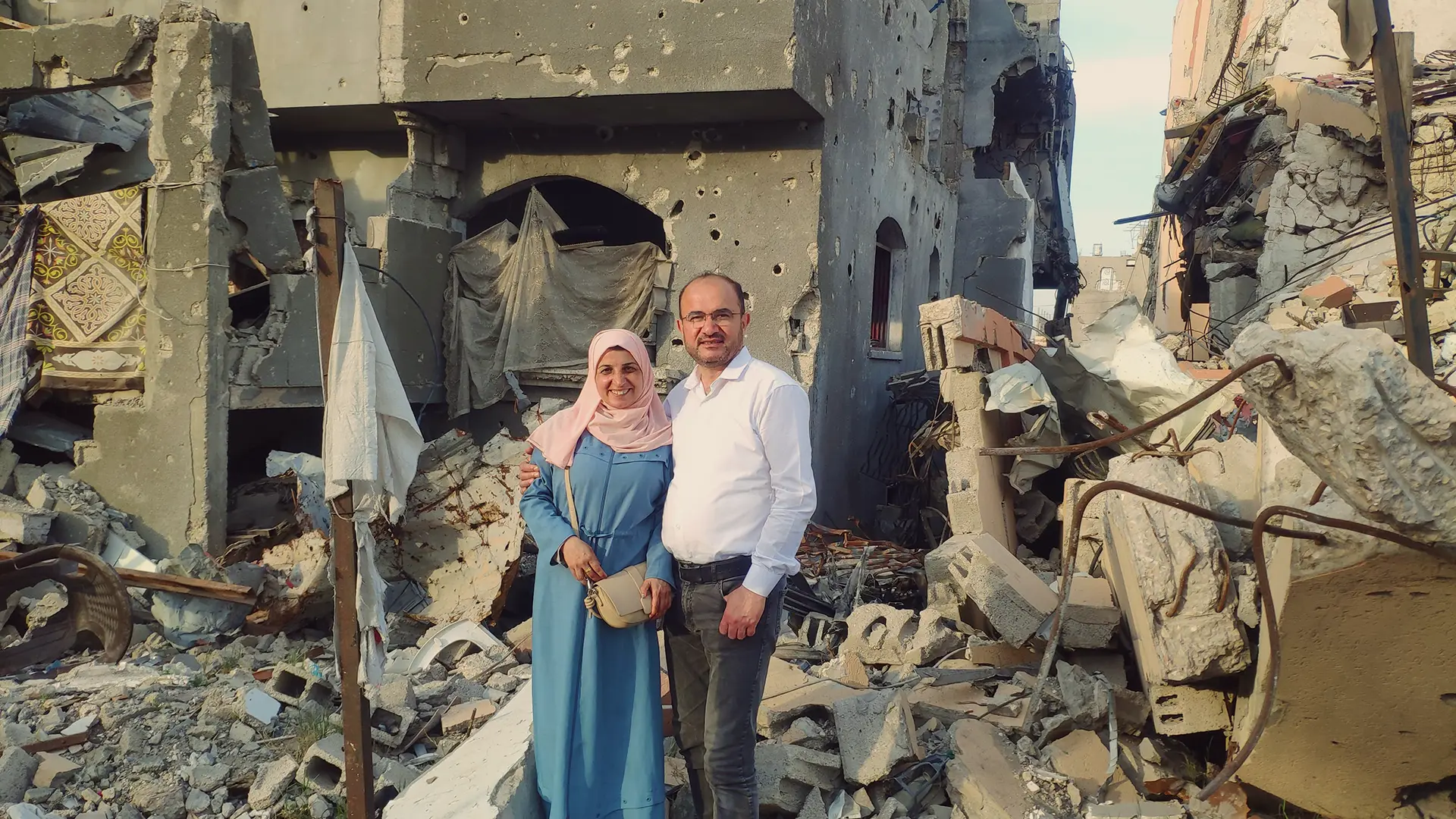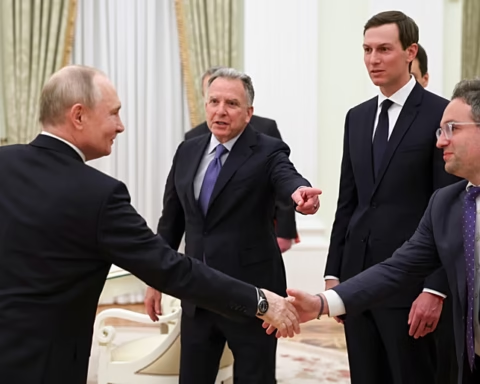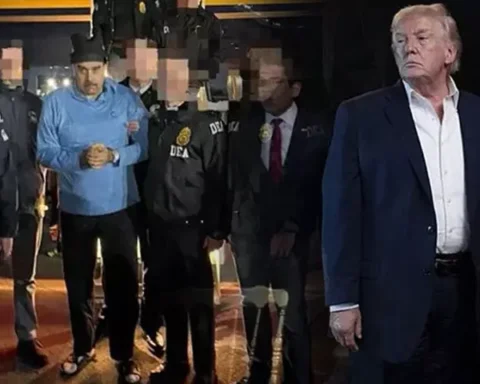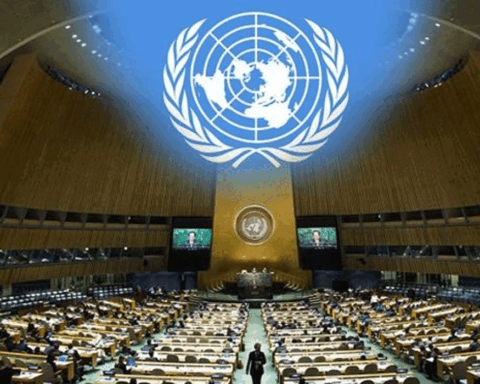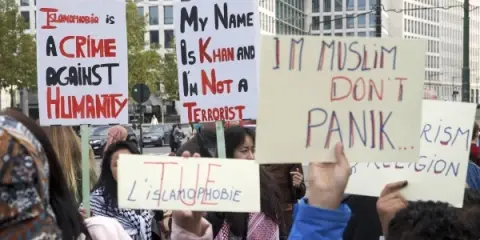One such story is that of Prof. Dr. İbrahim Uygun, Head of the Department of Pediatric Surgery at the Faculty of Medicine, Kütahya University of Health Sciences in Türkiye. He went to Gaza as a volunteer, performed dozens of surgeries, and treated hundreds of wounded. But Gaza changed not only the lives of the wounded he treated, but also his own. He met a Gazan operating room nurse who was also a volunteer at the hospital, and by marrying her under the bombs, he opened a completely new page in his life. Unable to leave the devastated Gaza Strip with his wife, he tried to send a video message to President Erdoğan. Then the National Intelligence Organization of Türkiye stepped in and took him and his wife out of Gaza and brought them to Türkiye.
Gaza is full of stories of great tragedy. But there are also stories that inspire hope and deeply touch people.
One such story is that of Prof. Dr. İbrahim Uygun, Head of the Department of Pediatric Surgery at the Faculty of Medicine, Kütahya University of Health Sciences in Türkiye. He went to Gaza as a volunteer, performed dozens of surgeries, and treated hundreds of wounded. But Gaza changed not only the lives of the wounded he treated, but also his own.
He met a Gazan operating room nurse who was also a volunteer at the hospital, and by marrying her under the bombs, he opened a completely new page in his life.
Unable to leave the devastated Gaza Strip with his wife, he tried to send a video message to President Erdoğan. Then the National Intelligence Organization of Türkiye stepped in and took him and his wife out of Gaza and brought them to Türkiye.
Prof. Dr. İbrahim Uygun and his wife, İman Uygun, told their story for the first time to me, that is, Al Jazeera.net writer Kemal Öztürk.
A Story of Happiness and Sorrow
İbrahim Uygun has been a friend of mine for 35 years. Since his youth, he has always been admired for his intelligence, unique perspective, faith, and diligence. During our long years of friendship, he studied medicine and I studied journalism, but we always kept up to date with each other.
He wrote about the pain he experienced while sending me the photos and videos he took when he was in Gaza. For two months, under intense bombardment and extreme deprivation, he operated on and treated children injured by Israeli attacks.
One day, he sent me a video to be delivered to President Erdoğan. In the video, he said that he was stranded in Gaza with his newlywed wife and asked for help to get them out of there. He had also sent it to a few others besides me. I forwarded it to the relevant authorities. Shortly after, I learned that the National Intelligence Organization of Türkiye had stepped in and launched an effort to get them out.
After a difficult and distressing journey, they were brought to Türkiye last week via Jordan. As soon as he returned Türkiye, I spoke to him and his wife and listened to their experiences.
— How did you go to Gaza?
Since the day the October 7 events began, I wanted to go to Gaza voluntarily. As a pediatric surgeon, I had significant experience in earthquakes, terrorist incidents, and disasters. I thought this would be helpful in treating children in Gaza. Initially, one could go to Gaza through the Turkish-Palestinian Doctors Association (FilMed) and the European Palestinian Doctors Association (PalMed), via the World Health Organization (WHO). Of course, this was a difficult process and could only be done with the permission of the occupying power, Israel. I struggled for almost a year to go to Gaza.
The first attempt was in December 2024 when four Turkish doctors were invited to Amman. However, Israel did not allow entry for three of them, and we had to return to Türkiye. After evaluating my persistent requests to go to Gaza, the association officials called me again shortly afterward, and this time, I was able to enter Gaza with a group of doctors via the Kerem Shalom crossing on January 28, 2025.
— What kind of the scene did you encounter?
There was massive destruction. As doctors, we were all shocked by what we saw. What surprised me most was the absence of any living trees or animals. There were no chickens, geese, sheep, or cows in the streets. Most of them had perished, and the rest was consumed by the people struggling with hunger. I witnessed the concept of famine up close for the first time there. The people were in a miserable state and were literally struggling to survive hunger.
— I guess you entered during the ceasefire?
Yes, the ceasefire process had begun, and there was a migration from southern Gaza to the north. Tens of thousands of people were migrating using donkey carts or any vehicle they could find. Even though their homes were destroyed, they wanted to see them. The crowds were so massive that it took us seven hours by car to travel a 20-kilometer road. We were placed in Al-Ahli Arab Hospital, which used to be an old Christian Baptist hospital. Our group was going to stay there, but I was assigned to work at the Patient’s Friends Hospital, 3 kilometers away.
That hospital was like a trauma center, and we also treated injured children.
— What was the condition of the hospitals and the state of medical resources?
Israel was deliberately targeting hospitals in Gaza. The largest hospitals had been destroyed. Hundreds of doctors and patients were martyred in those hospitals, many of whom were buried in the hospital gardens. The remaining hospitals had also been hit, but some parts were still usable.
The tomography device is of vital importance for us surgeons. We rely on it to locate shrapnel or bullet fragments in the body or skull before surgery. In a city with 2.5 million population, only two tomography devices remain functional. Injured patients were rushed to whichever hospital had the machine, and if necessary, transferred to another hospital’s operating room afterward.
Other medical equipment was in a similar state. Surgical materials were very limited, and we were operating under extremely difficult conditions. Since we were treating children, I saw firsthand how much more their small bodies were affected by shrapnel and bullets. There was no electricity, and we ran the operating room using generators.
Even during the ceasefire, the bombings and drone attacks didn’t stop. There were times when we had to continue operations amidst the sounds of bombs, missiles and rockets.
In the hospital rooms, seven or eight patients were lying side by side. Not a single room or bed was empty. We, the doctors, were stuck in a room and sleeping without any heating. During the cold nights, we wore five or six layers of clothing just to sleep. The children couldn’t endure the cold, and many babies froze to death.
“I can’t forget the effect one child had on me.”
During a bombing, they brought in a wounded boy around 9 or 10 years old. His friends had died during a drone strike while they were playing. A piece of shrapnel had entered his neck and damaged his spinal cord. He was paralyzed, with no control over any part of his body. We had to open a hole in his throat so he could breathe, and he was dependent on a machine. He could only speak. One day, I sat next to him and asked, “How are you?” He smiled and said, “Alhamdulillah.” I can’t remember another moment in my life that was so touching. Even in that situation, this little boy was smiling and giving thanks.
The children I saw in the streets had already amazed me. Even during bombings, they were playing outside, in parks, in gardens. I would be nervous hearing the sound of bombs and missiles, but they weren’t afraid. They weren’t scared of death, injury, rockets, or bombs.
— How was the psychological state of the people in Gaza?
Everyone who came to Gaza from outside, like me, was not just helping the people but going through a kind of spiritual education, learning a lot, and experiencing inner purification. I saw that Palestinians deeply love life, but equally, they embrace death. To them, both are part of life. They fully believe that martyrs never truly die. When the sound of a missile approached and I became nervous, my wife’s brother said, “When we hear a missile getting close, we think paradise is approaching, so we’re not afraid.”
I’ve never seen a nation so spiritually strong. The verses they recited during prayers were all directly from their lived experiences. Reciting the verse of jihad while the bombs were exploding, reciting the verse that says you will be tested with your wealth and your lives, directly affected people’s hearts.
I didn’t see anyone crying because their house was destroyed, or rebelling against fate because they lost a child, or wailing in helplessness. These people were living the verse, We belong to God and to Him we shall return, and that deeply moved us.
I did not see a single woman with dirty clothes or even wrinkled clothes. They were all cleanly dressed, wearing their hijabs and taking personal care of their children.
Life and death coexist in an intensely vivid way here. I received more spiritual nourishment here than in prayers I’ve performed in Mecca. The spiritual atmosphere was incredibly powerful.
There were no beggars, no looting, no theft, no disorder, no chaos. I was astonished. The moral decay and chaos that typically accompany war weren’t present here. The people of Gaza live on an entirely different level.
— You married a lady from Gaza there. How did this happen?
I wanted to adopt children of martyred Palestinians in Gaza and take care of them for the rest of their lives. But they told me this was neither legally nor practically possible. They said it might only be possible if I married a widow of a martyr who had children.
I was single, and ten days before I was supposed to return, I said I wanted to marry a martyr’s widow who had four or five children. The wives of doctors in Gaza looked into it. But none of the widows were willing to marry and take their children out of Gaza to raise them in another country.
There was a nurse who came to the hospital as a volunteer to help with our surgeries, her name was Iman. She had grown up as an orphan and had dedicated her life to patients and her family. We met here and with God’s grace, a close relationship developed between us.
I told Dr. Fadıl, the Chief Physician of Al-Ahli Arab Hospital, that I wanted to marry Iman, and he was very supportive. He took the lead and we went together to ask for her hand in marriage. Iman spoke with her family as well. Her family said that, under the current circumstances where it was not possible for Iman to leave Gaza, they could only agree to an engagement for now. A wedding could be held once the war ended and they were able to leave Gaza. I accepted.
They held a marriage proposal ceremony in the Palestinian style. Immediately afterwards, the men gathered in one room of the hospital and the women gathered in another room and we held a ceremony. Prayers were said, songs were sung, rituals were performed and we got engaged.
— How did all this happen in the middle of a war?
When the wounded arrived, we would go into surgery. When we were done, we would go out and walk along the coast of Gaza. Bombs were exploding, missiles were being fired, UAVs were flying in the air, but this no longer affected us as it did not the Gazans.
We went shopping for the engagement at whatever open shops we could find, and somehow managed to find jewelry. I had run out of money, so I borrowed from fellow doctors. But honestly, God had placed such love in our hearts that we felt we needed nothing. Our civil marriage was officiated in a half-destroyed courthouse, and our paperwork was prepared. From the moment we met to the official marriage, everything was completed within seven days.
— You were stranded in Gaza for a while, right? How did you eventually leave?
When the ceasefire ended and the heavy bombardment began again, the World Health Organization wanted to evacuate us from Gaza. However, I did not want to return and decided to stay here for a while longer. It was during this time that I met Iman. Later, when I got married, I wanted to take my wife out as well, with the consent of her family. But it was almost impossible to leave in a war environment and besides, her passport had expired. The official buildings that were supposed to renew his passport had been demolished.
The World Health Organization wanted to take me out of Gaza again. I wanted them to take my wife too, but when they said that wasn’t possible, I decided to stay in Gaza with her. We stayed for a while longer, and as a last resort, I thought about asking our President Recep Tayyip Erdoğan for help.
— How did you deliver the video message to President Erdoğan?
My wife and I recorded a video together. In it, we explained that we had gotten married in Gaza but were unable to leave, and we requested the help of our President. When we found internet access, I sent the video to a few people in Türkiye, one of them was you. A day or two later, my phone rang; a Turkish official said they would get us out of Gaza and asked us to make our way to the Kerem Shalom crossing. Apparently, my video message had reached the right people.
Until that moment, we were convinced that my wife would never be able to leave Gaza, so we prepared with great excitement to head from the north to the south. We only had one suitcase. It was going to be my wife’s first time ever leaving Gaza. She brought a few childhood memories and photos with her, and we set off. Using donkey carts, tractor trailers, and any vehicle we could find, we reached the southern region near the border crossing. But we couldn’t actually get to the Kerem Shalom exit point. After waiting for eight days, the authorities were finally able to include us in a convoy of two Chilean families, and that’s how we reached the border. However, they did not allow us to carry our luggage with us, so we took a few documents, left all our belongings behind and crossed the border hand in hand, walking. Our names were on the list, but since my wife’s passport had expired, we ran into problems again. On the Israeli side, Jordanian officials received us and took us to the Jordanian border through alternative routes. There, the expired passport was once again a problem, but with the help of Turkish embassy officials, we were able to cross. Our embassy in Amman issued a passport for my wife in just one day, and then we were flown to Istanbul. It took us 11 days from the moment I sent the video to arrive in Türkiye.
What we went through felt like a movie scene. I think the deadly atmosphere of war, the journey that lasted for days under deprivation and destruction, the waiting, the anxiety and the worry are things I will never forget in my life. But Allah granted us a home, and has blessed us with the chance to raise faithful generations like the children in Gaza. For this, we will pray for President Erdoğan, the head of the National Intelligence Organization, and everyone involved, for the rest of our lives.
“İman: I am living happiness, and sorrow all at once.”
— Iman, how do you feel?
I am living both happiness and sorrow at the same time. Honestly, I didn’t want to leave Gaza. Leaving the hospital, my fellow doctors, and our patients was incredibly difficult for me. But the love that formed between Ibrahim and me convinced me. I cried a lot and felt deep sorrow on the journey. I had never seen another country before in my life. When we passed into Jordan and I saw Israeli soldiers during a rest stop, I was startled and deeply shocked.
What I saw in Jordan and Türkiye surprised me a lot, I saw that the world was different. But we will never stop fighting for Gaza. Even here in Kütahya, we will continue to work for Gaza, for a free Palestine. And one day, we will return to a free Palestine, to a liberated Gaza, I believe this with all my heart…
Prof. Dr. İbrahim Uygun has resumed his duties at the hospital in Kütahya. They plan to have a traditional Turkish wedding ceremony and to invite President Erdoğan and National Intelligence Chief İbrahim Kalın to the celebration.
His heart remains with Gaza. He continues to support the aid efforts and the work of doctors there.
Source: aljazeera.net

